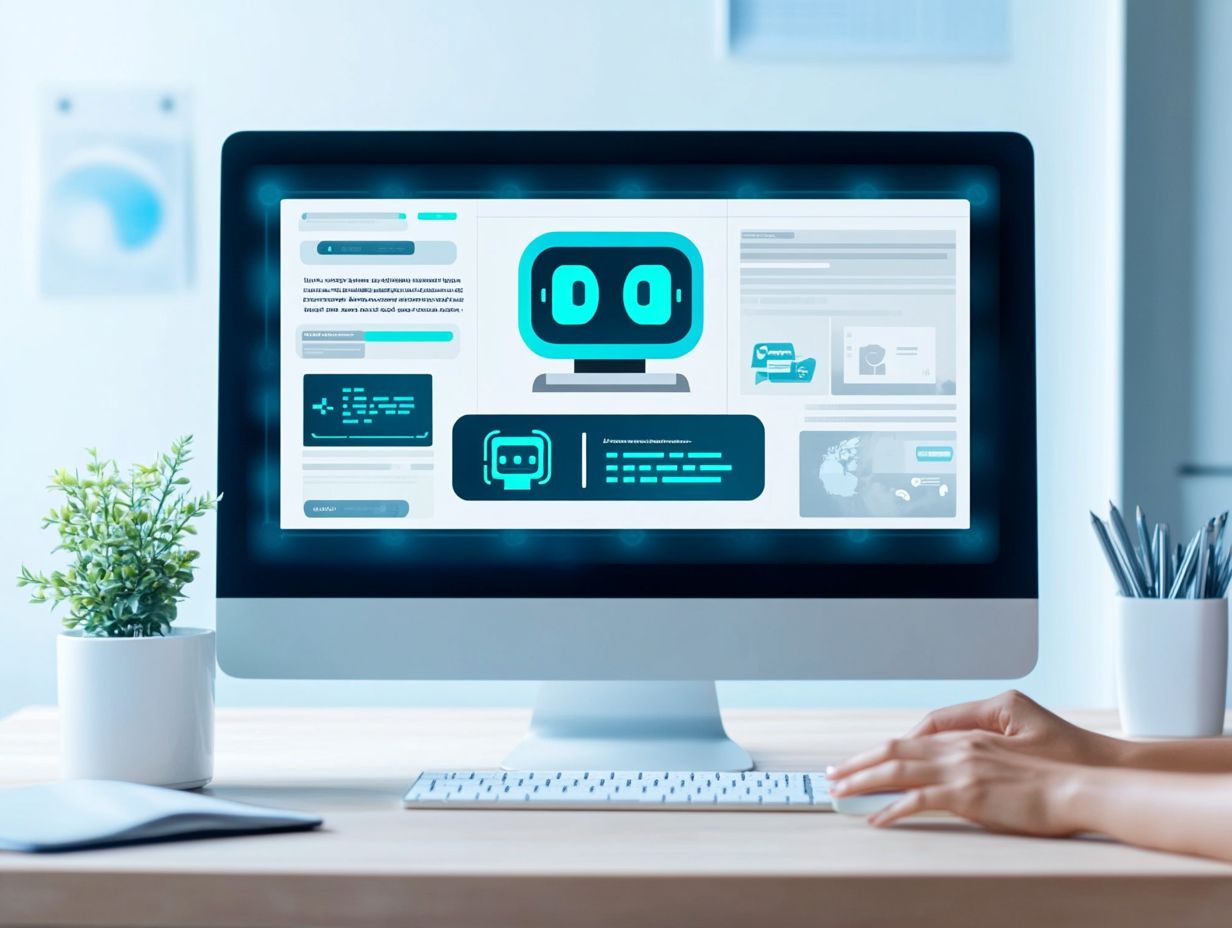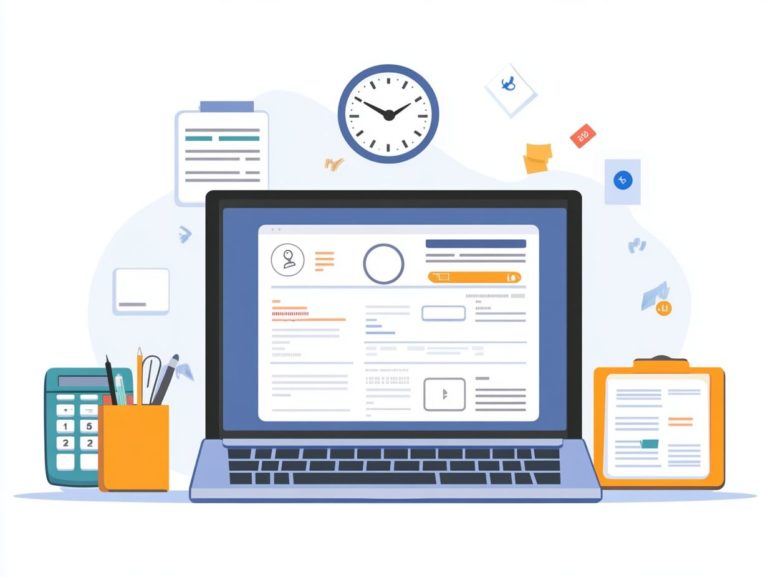Integrating Your CRM with Chatbots for Customer Service
In today s fast-paced digital landscape, you ll find that businesses are increasingly leveraging technology to enhance customer interactions. Chatbots are transforming the way companies engage with clients, while Customer Relationship Management (CRM) systems are streamlining data management and communication.
Get ready to explore the exciting synergy between chatbots and CRM integration that can transform your business! This article showcases the myriad benefits, provides a step-by-step guide for implementation, and offers best practices to maximize efficiency. Don t miss out on this opportunity to elevate your customer service!
Discover how this dynamic combination can elevate your customer service and propel your business toward success.
Contents
- Key Takeaways:
- Understanding Chatbots and CRM Integration
- The Benefits of Integrating Chatbots with CRM
- How to Integrate Chatbots with Your CRM
- Choosing the Right Chatbot and CRM for Your Business
- Best Practices for Using Chatbots in Customer Service
- Future of Chatbot and CRM Integration
- Frequently Asked Questions
- What is the benefit of integrating your CRM with chatbots for customer service?
- How does integrating your CRM with chatbots for customer service work?
- What types of customer service tasks can chatbots handle?
- Can integrating your CRM with chatbots improve customer satisfaction?
- Are there any potential challenges to integrating your CRM with chatbots for customer service?
- How can integrating your CRM with chatbots benefit your business?
Key Takeaways:

Integrating chatbots with CRM can enhance customer service by providing efficient and personalized responses. By combining chatbots with CRM, businesses can improve data collection and analysis, leading to better decision-making and customer insights. Choosing the right chatbot and CRM for your business requires considering factors such as functionality, integration capabilities, and cost.
Understanding Chatbots and CRM Integration
Understanding how to integrate chatbots with Customer Relationship Management (CRM) systems is important for businesses looking to elevate their customer communication and optimize their management processes.
By using advanced tools and platforms like Salesforce and HubSpot, you can significantly enhance customer interactions and craft personalized experiences tailored to the unique needs of each customer.
The contribution of chatbots, such as those created by Aivo and AgentBot, is pivotal in bridging the divide between your business and its clients, laying the groundwork for enduring customer relationships.
What are Chatbots and CRM?
Chatbots are automated conversational agents that leverage machine learning and natural language processing to engage with users. They provide instant responses and elevate customer support, while CRM is a tool that helps businesses manage customer information and interactions with precision.
These sophisticated tools come in various forms, from simple rule-based bots that follow a scripted conversation path to advanced AI-driven systems that grasp context and sentiment.
Chatbots typically handle multiple roles, such as:
- Answering frequently asked questions
- Assisting with product recommendations
- Facilitating transaction processes
When you integrate chatbots with CRM systems, you not only streamline data management but also personalize user experiences by analyzing customer interactions and preferences. This synergy cultivates enhanced customer service and boosts operational efficiency, underscoring the crucial role of automation in today’s competitive landscape.
The Benefits of Integrating Chatbots with CRM
Integrating chatbots with your CRM systems presents a wealth of advantages that can elevate customer satisfaction to new heights, streamline your sales productivity, and enhance lead generation.
This strategic approach fosters substantial business growth and ensures improved data quality across your customer profiles.
Improved Customer Service
Integrating chatbots with CRM systems offers one of the most significant advantages in enhancing customer service. This technology enables your business to provide instant replies and manage customer interactions with remarkable efficiency through automation.
These intelligent systems also reduce response times while engaging your customers on a more personal level, fostering deeper connections. By offering 24/7 support, chatbots ensure that queries are addressed promptly, which translates to higher customer satisfaction and loyalty.
Your support team plays a crucial role in this equation by overseeing the chatbot’s performance, refining its responses, and stepping in for more complex inquiries. This collaboration between automation and human interaction creates a seamless experience, leading to more efficient interactions and optimized service delivery.
Streamlined Data Collection and Analysis

Integrating chatbots with your CRM systems enables streamlined data collection and analysis. This allows you to gather customer information efficiently and create precise customer profiles that support well-informed decisions.
This seamless integration not only enhances data quality but also improves performance monitoring, which is crucial for responding swiftly to market changes.
For instance, by leveraging automation, you can analyze interaction patterns and customer feedback in real time. This facilitates more dynamic strategic planning.
Imagine a retail company using this data to pinpoint trending products among specific customer demographics, leading to targeted marketing campaigns.
Service-oriented businesses can track customer satisfaction levels through chat engagements. This allows them to refine their service offerings to better align with client needs and expectations.
How to Integrate Chatbots with Your CRM
Integrating chatbots with your CRM can be a transformative experience that elevates customer communication and management to new heights. Follow a clear step-by-step guide to handle the technical challenges involved and achieve seamless integration with platforms like Salesforce and HubSpot.
Step-by-Step Guide
The step-by-step guide for integrating chatbots with CRM systems is a structured journey, including important steps like setup, testing, and deployment. This ensures that solutions such as Aivo and AgentBot seamlessly fit into your customer management framework.
To start, evaluate your current CRM environment and assess its compatibility with the chosen chatbot platforms.
Next, embark on the straightforward configuration process, which typically involves entering API keys and specific integration settings.
Once configured, it’s vital to test the connection using various scenarios to confirm that the interaction between the chatbot and CRM data flows smoothly.
Following successful testing, the final stage is deployment, where you launch the chatbot, ready to provide real-time support.
Tools like Aivo and AgentBot not only streamline these processes but also elevate user experience by offering insightful analytics and performance monitoring after deployment.
Choosing the Right Chatbot and CRM for Your Business
Choosing the perfect chatbot and CRM can elevate your business like never before. It’s essential to weigh various factors that align with your customers’ needs and expectations, particularly when it comes to user experience and integration capabilities.
Thoughtful consideration in this choice can significantly impact your overall success in fostering strong connections with your clientele.
Factors to Consider
When selecting the right chatbot and CRM, keep several key factors in mind: customization options, pricing, and the availability of customer support. These elements are crucial for choosing tools that truly meet your business needs.
Customization options are vital because they empower you to tailor functionalities to fit your unique workflows and enhance customer interactions. You want a solution that works with you, not against you.
Pricing models also merit careful consideration. Evaluate whether the costs are structured as a one-time fee, subscription-based, or offer pay-as-you-go options. This decision can significantly impact your budgeting and overall financial planning.
Strong customer support shouldn’t be overlooked. Having timely assistance readily available can simplify both the implementation and troubleshooting processes, ensuring a smooth experience while maximizing the value you get from these technologies.
Consider these factors carefully. This will help you make a decision that boosts your efficiency.
Best Practices for Using Chatbots in Customer Service

Using best practices for chatbots is key to maximizing their effectiveness. By focusing on these strategies, you can significantly enhance customer interactions and engagement, leading to a notable improvement in customer satisfaction.
Tips for Maximizing Efficiency and Effectiveness
To truly maximize the efficiency and effectiveness of chatbots in your customer service, focus on enhancing response times, automating frequently asked questions, and continuously optimizing the user experience.
By implementing strategic automation, you can free up valuable human resources. This allows your team to tackle more complex issues while the chatbots efficiently handle routine inquiries.
Integrating real-time updates into your chatbot s system ensures that customers receive the most current information. This enhances their satisfaction and trust in your brand.
Leverage user feedback to improve interactions, ensuring they remain relevant and user-friendly.
By prioritizing seamless interactions, you not only boost operational efficiency but also elevate the overall customer experience, creating a more effective communication channel.
Future of Chatbot and CRM Integration
The future of chatbot and CRM integration is set to undergo remarkable transformations, driven by new AI technology that not only bolsters customer loyalty but also addresses ethical concerns surrounding data privacy and user experience.
These advancements will redefine how businesses engage with their customers, creating a more secure and personalized interaction that resonates with today s conscientious consumer.
Potential Developments and Advancements
Imagine the potential advancements on the horizon for chatbot and CRM technology. AI, machine learning, and natural language processing can create more sophisticated and effective customer interactions.
These innovations are set to transform how you engage with your customers, making every interaction not just more personalized, but significantly more efficient.
As automated messaging systems become increasingly skilled at understanding complex customer queries, you can expect faster response times and greater satisfaction.
Envision the seamless integration of chatbots with CRM systems. This enhances your data management capabilities and allows you to gather valuable insights and analytics that can shape your future strategies.
Such a convergence paves the way for a future where proactive customer support is the standard, fundamentally reshaping the landscape of customer service as you know it.
Frequently Asked Questions
What is the benefit of integrating your CRM with chatbots for customer service?

Integrating your CRM with chatbots allows for seamless communication between your customer service team and customers. This approach can streamline customer support, leading to improved efficiency, faster response times, and enhanced customer satisfaction.
How does integrating your CRM with chatbots for customer service work?
Integrating your CRM with chatbots involves connecting the chatbot technology with your CRM system. This allows for the exchange of data and information between the two, enabling chatbots to access customer information and provide personalized support.
What types of customer service tasks can chatbots handle?
Chatbots can handle a variety of customer service tasks, such as answering FAQs, providing order updates, scheduling appointments, and processing returns or refunds. They can also collect customer feedback and escalate complex issues to a human representative.
Can integrating your CRM with chatbots improve customer satisfaction?
Yes, integrating your CRM with chatbots can improve customer satisfaction by providing fast and efficient support, personalized interactions, and 24/7 availability. This can lead to increased customer loyalty and a positive brand reputation.
Are there any potential challenges to integrating your CRM with chatbots for customer service?
One potential challenge may be ensuring that chatbot technology accurately interprets and responds to customer inquiries. It is important to regularly monitor and update the chatbot’s responses to ensure a positive customer experience.
How can integrating your CRM with chatbots benefit your business?
Integrating your CRM with chatbots can benefit your business in several ways, including reducing customer service costs, freeing up human resources for more complex tasks, and providing valuable data and insights on customer interactions and preferences, as highlighted in the rise of AI in CRM integrations.






